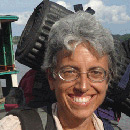
When Sara Armas Díaz goes hunting, she pauses before entering the woods and pays her respects to the forest spirits.
“I carry a lighted branch and say the name of the animal I want, and within a short time, I see it,” says Armas, 51, a Cocama grandmother who learned the ritual from her grandparents when they took her hunting for the first time at age 10.
In communities along the Loretoyacu River in the Ticoya Reserve or resguardo, a territory shared by Ticuna, Cocama and Yagua indigenous people, many hunters have stories of encounters with forest spirits that help them find game or keep them from hunting in a certain place.
Those encounters, combined with practices related to preparing the meat for meals, are traditional ways of controlling hunting in the territory, according to researchers from the Center for International Forestry Research (CIFOR).
SACRED PLACES
The researchers are studying the hunting, use and commercialization of bushmeat in the area around the reserve, on the Amazon River where the borders of Colombia, Peru and Brazil converge.
“The hunters never mention the word ‘conservation,’ but what they are doing is conservation related,” said Nathalie Van Vliet, a senior researcher with CIFOR, who leads the research team.
“They also have practices related to reducing health risks—for example, kids should not eat a certain part of a particular animal,” she said. “They don’t call them health regulations, but by regulating consumption of the meat, they also contribute to conservation.”
Different hunters recount different—and sometimes conflicting—beliefs, but collectively, they constitute a control on hunting.
When certain plants are flowering or bearing fruit, the meat of animals that feed on them has an unpleasant flavor and can cause nausea, diarrhea or rashes, Armas said. She and her husband, Gabriel Murayari Pinedo, 63, avoid hunting those animals in places where they see those plants. Hunters avoid other places for other reasons.
“There are places where you can’t hunt,” said Milton Pinto, 22, a Ticuna who, like Armas and Murayari, lives in Puerto Nariño, a town of about 7,000 people in the Ticoya Reserve.
The hunters never mention the word ‘conservation,’ but what they are doing is conservation related.
One is a certain salt lick—a place where animals tend to congregate, which makes them easy prey.
“It’s a sacred place,” Pinto said. “You have to respect it.”
NATURAL CONTROLS
Hunters offer various accounts of that salt lick and others—as places where hunting is permitted, but hunters can only take what they need, or as places that keep hunters at bay, with thunder, lightning and rain if a hunter gets too close.
“The place has a madre, a spirit,” Pinto said.
In surveys of community members, including hunters, traders and restaurant operators, the researchers found that more than two-thirds of the beliefs that limited the hunting or use of wild game were related to consumption. Eating the meat of a tapir, for example, could cause a pregnant woman to miscarry. Women also should not look at or touch the turtle known as a matamata, the researchers learned.
The largest number of “taboos” about meat consumption involved the jaguar, a top predator that also has spiritual significance to many Amazonian people. Other animals regulated by traditional beliefs included tapirs and snakes.
The largest number of beliefs related to the way meat is handled involved turtles—for example, touching the blood of a turtle while preparing the meat is said to produce warts. Only 10 percent of the people surveyed said that ignoring such traditional beliefs would have no negative effect. More than half said failure to respect taboos could cause illness, while others said it could result in a decrease in the number of animals or make hunters unlucky in their search for wild game.
Fishermen respect similar practices, Pinto said. One lake in the reserve is known to fishermen as a dangerous place, home to huge river otters, jaguars and giant caimans.
“You have to fish silently,” said Pinto, adding that some parts of the lake were off limits.
When Pinto was younger, an elderly fisherman showed him which parts of the lake were safe for fishing and which should be left alone.
“It’s a kind of natural control,” he said.
We want you to share Forests News content, which is licensed under Creative Commons Attribution-NonCommercial-ShareAlike 4.0 International (CC BY-NC-SA 4.0). This means you are free to redistribute our material for non-commercial purposes. All we ask is that you give Forests News appropriate credit and link to the original Forests News content, indicate if changes were made, and distribute your contributions under the same Creative Commons license. You must notify Forests News if you repost, reprint or reuse our materials by contacting forestsnews@cifor-icraf.org.













